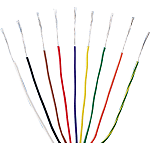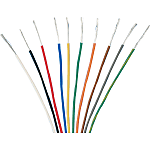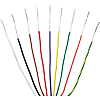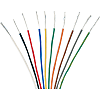(!) Since support from Microsoft will end on January 14th, 2020, Windows 7 will be excluded from the recommended environment from December 15th, 2019 on this site. Vì lý do Microsoft kết thúc hỗ trợ cho Windows 7 vào ngày 14/01/2020, Windows 7 sẽ là hệ điều hành không được khuyến khích sử dụng với trang web này từ ngày 15/12/2019.
Search by Category / Brand Tìm theo danh mục, nhãn hiệu
Search by Category Tìm theo danh mục
- [Thông báo] Cập nhật địa chỉ kho tập kết hàng hóa tại khu vực miền Nam của MISUMI Việt Nam. Xem chi tiết.
[Announcement] Update on warehouse address in the Southern region of MISUIMI Vietnam. See more. - [Cảnh Báo] Thủ Đoạn Lừa Đảo Từ Nhân Viên Giao Hàng – Yêu Cầu Trả Phí Ship. Xem chi tiết.
[Warning] Fraud Calling from Shipper - Asking to Pay Shipping Fee. See more.
Insulation Wires for Electric / Electronic / Communication Equipment(Sheath (outer coating) color:Brown)
Brand |
|
|---|---|
| CAD |
|
| Days to Ship |
|
2 itemsMặt hàng
- Sort By
-
You can add up to 6 items per a category to the compare list.

Cable UL1007 UL / CSA Supported
MISUMI
300 V international standard single core wire. It has excellent flexibility and heat resistance. (operating temperature: 0 to 80°C)
- CSA
- VW-1
- ULAWM
- For Signal
- Sensor
- Strand Wire
- 300 V
Conductor Cross Section(mm2) AWG size(AWG) Sheath (outer coating) color Rated Voltage Properties Overall Length(m) Finished outer diameter(mm) Representative Standard Insulation body materials Shield Sheath (outer coating) material 0.2 24 Brown 300V - 10 ~ 305 1.5 UL / CSA(c-UL) - NA PVC (Polyvinyl Chloride) From: 230,513 VND Days to Ship: Số ngày giao hàng: Same day  Same day
Same day
-
You can add up to 6 items per a category to the compare list.

MISUMI
300 V international standard single core wire. The manufacturer has prepared 10 colors including (green/yellow) for the ground wire.
- c-UL
- VW-1
- ULAWM
- For Signal
- Sensor
- Strand Wire
- 300 V
Conductor Cross Section(mm2) AWG size(AWG) Sheath (outer coating) color Rated Voltage Properties Overall Length(m) Finished outer diameter(mm) Representative Standard Insulation body materials Shield Sheath (outer coating) material 0.3 22 Brown 300V - 10 ~ 305 1.68 UL - NA PVC (Polyvinyl Chloride) From: 231,043 VND Days to Ship: Số ngày giao hàng: Same day  Same day
Same day
| BrandNhãn hiệu |
|---|
| Product SeriesDòng sản phẩm |
| From |
| Days to ShipSố ngày giao hàng |
| SpecificationsĐặc điểm kĩ thuật |
| Conductor Cross Section(mm2) |
| AWG size(AWG) |
| Sheath (outer coating) color |
| Rated Voltage |
| Properties |
| Overall Length(m) |
| Finished outer diameter(mm) |
| Representative Standard |
| Insulation body materials |
| Shield |
| Sheath (outer coating) material |
You can add up to 6 items per a category to the compare list. | You can add up to 6 items per a category to the compare list. | |
| BrandNhãn hiệu | MISUMI | MISUMI |
| Product SeriesDòng sản phẩm | ||
| From | 230,513 VND | 231,043 VND |
| Days to ShipSố ngày giao hàng | Same day | Same day |
| SpecificationsĐặc điểm kĩ thuật |
|
|
| Conductor Cross Section(mm2) | 0.2 | 0.3 |
| AWG size(AWG) | 24 | 22 |
| Sheath (outer coating) color | Brown | Brown |
| Rated Voltage | 300V | 300V |
| Properties | - | - |
| Overall Length(m) | 10 ~ 305 | 10 ~ 305 |
| Finished outer diameter(mm) | 1.5 | 1.68 |
| Representative Standard | UL / CSA(c-UL) | UL |
| Insulation body materials | - | - |
| Shield | NA | NA |
| Sheath (outer coating) material | PVC (Polyvinyl Chloride) | PVC (Polyvinyl Chloride) |
Loading...Tải…
ConfigureTạo
Specification/DimensionsĐặc điểm kỹ thuật / Kích thướcĐặc điểm kỹ thuật / Kích thước
-
Conductor Cross Section(mm2)
-
AWG size(AWG)
-
Sheath (outer coating) color
- Black
- White
- Brown
- Red
- Orange
- Yellow
- Green
- Blue
- Navy
- Green/Yellow
- White/Blue
-
Rated Voltage
- For High Voltages
- 600V
- 300V
- For Low Current Circuits
- Other
-
Properties
- Oil Resistance
- Heat-Resistance
- Cold Resistance
- Weatherproof
-
Overall Length(m)
-
Finished outer diameter(mm)
-
Representative Standard
-
Insulation body materials
- Rubber
-
Shield
-
Sheath (outer coating) material
- PVC (Polyvinyl Chloride)
- Other
Related Categories to Insulation Wires for Electric / Electronic / Communication EquipmentDanh mục liên quan đến Insulation Wires for Electric / Electronic / Communication Equipment
FAQ Wire Cable
- Question: How many types of wires are there and how to choose the right wires?
- Answer: Cable can be separated into 2 types.
1. Low voltage cable which using for electric system with voltage 750V or less. Typically, this type of cables is made of copper or aluminum such as THW, VAF, VCT and NYY.
2. High voltage cable which using for electric system with voltage 1kV-36kV, conduct structure are stranded wire such as Aluminum Conductor (AAC), Aluminum Alloy Conductor (AAAC), Aluminum Conductor Steel Reinforced (ACSR), Partial Insulated Cable (PIC), Space Aerial Cable (SAC), Preassembly Aerial Cable (PAC) and Cross-linked Polyethylene (XLPE)
Cable should select based on using electrical voltage and current. Moreover, we should select cable insulation which suit for operating environment such as Heat resistance, weather resistance or chemical resistance. - Question: What are the components in the cable?
- Answer: Cable components are consisting of 3 parts as below.
1. Conductor
Made of metal wire, use for transmitting the electricity.
2. Insulator
Insulator is the component which is cover conductor wire to block electricity from conductor transmit to another part.
3. Sheath
The outer cover of cable use for protecting any harm to cable inside such as scratch, weather, and heat. - Question: What types of wires are used in households?
- Answer: Cable for home appliance is low voltage cable type which is applicable for voltage 750V or less such as,
1. THW cable, which consist of solid-core conductor wire with PVC insulator. Suit for wiring inside the building.
2. VHF cable, which consist of multiple solid-core conductor wire with colored insulator inside white sheath. Suit for wiring inside the building.
3. VCT cable, which consist of multiple stranded conductor wire with insulator inside the black sheath. Due to, heat and water resistance properties, this cable can be wiring outside the building. However, it cannot not wire directly underneath the ground. I should wire through electrical conduit pipe. - Question: What applications are 1.5 mm wires suitable for?
- Answer: 1.5 mm2 is suit for general electrical home appliance which using current not exceed 15A and power does not exceed 3.5 kW.
- Question: Why are there different colors of wires?
- Answer: Electrical wires are identified by their insulating casings. To identify wires quickly and easily, nearly all electrical and electronic devices use color-coding.
A live or hot circuit is typically black or red, but yellow or blue are also suitable.
Neutral wires can be gray or white.
Ground wires can be green, green with yellow stripes, or bare copper.
Due to the colors' variability, learning the ropes can be confusing. When installing a new light fixture or during a blackout, you might find it helpful to know the meaning of the colors. Electric wires carry high voltages that may cause injury if you are not careful.









How can we improve?
How can we improve?
While we are not able to respond directly to comments submitted in this form, the information will be reviewed for future improvement.
Customer Privacy Policy
Thank you for your cooperation.
While we are not able to respond directly to comments submitted in this form, the information will be reviewed for future improvement.
Please use the inquiry form.
Customer Privacy Policy